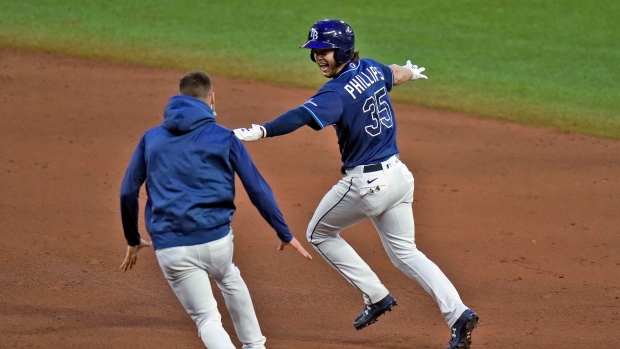May 14, 2021
Phillips, Rays rally late, end Mets' seven-game winning streak
Brett Phillips hit an RBI single with two outs in the ninth inning and the Tampa Bay Rays stopped the Mets' seven-game winning streak, rallying past New York 3-2 Friday night.
The Canadian Press

When Phoenix's Deandre Ayton reached over the rim to dunk Jae Crowder's pass for what became the winning points of the Suns' 104-103 win over the Los Angeles Clippers, several players immediately argued that the play was illegal.
Perhaps it was wishful thinking on their part.
Or, perhaps more likely, they did not fully understand the rule.
In almost any other situation, what Ayton did would have been a violation — offensive basket interference — and the shot shouldn't have counted. But in this situation, what he did was perfectly legal.
WHY DID IT COUNT?
NBA Rule 11, Section I, Subsection f gives part of the answer.
That rule states that a player shall not “touch any ball from within the playing area that is on its downward flight with an opportunity to score. This is considered to be a ‘field goal attempt’ or trying for a goal.”
Crowder's pass — an extremely difficult one — was not a field goal attempt. Because it was an inbounds pass, it would not have counted as a field goal even if it went through the basket untouched by a teammate. The goaltending rule doesn't apply for the same reason.
CAN THIS HAPPEN DURING LIVE PLAY?
No. Such a play only works with the clock not running, or in NBA parlance, when the ball isn't “live."
During a live-ball situation as play is happening, if Crowder wanted to throw an alley-oop pass to Ayton and not be part of a violation he would have to ensure that the ball isn't what's called “inside the cylinder" — basically, an imaginary ring extending up from the surface of the rim.
But the clock was not running. This was not a live ball.
From the NBA case book, addressing such a situation: “Goaltending or basket interference has not occurred. For either of these violations to occur, a ball which is alive must enter the cylinder area after having been legally touched on the playing court. All players must consider this type of play as an ordinary throw-in and anyone may attempt to gain possession of the ball without penalty.”
HAS THIS HAPPENED BEFORE?
Yes, and perhaps most notably, in Phoenix.
During a game on Dec. 26, 2017 between the Suns and Memphis Grizzlies — tied with 0.6 seconds remaining — then-Suns coach Jay Triano called for a play where Phoenix's Dragan Bender would throw an inbounds pass over the rim and set up Tyson Chandler for a dunk.
Triano had asked the NBA long beforehand if such a scenario would be legal. The NBA confirmed that it would be, and Triano kept the idea stashed in his mind for such a moment. Bender's pass was precise, Chandler got the dunk down and the Suns won 99-97.
“It’s a rule a lot of people don’t know," Triano said that night. “You cannot goaltend a ball that isn’t going to count.”
___
More AP NBA: https://apnews.com/hub/NBA and https://twitter.com/AP_Sports

